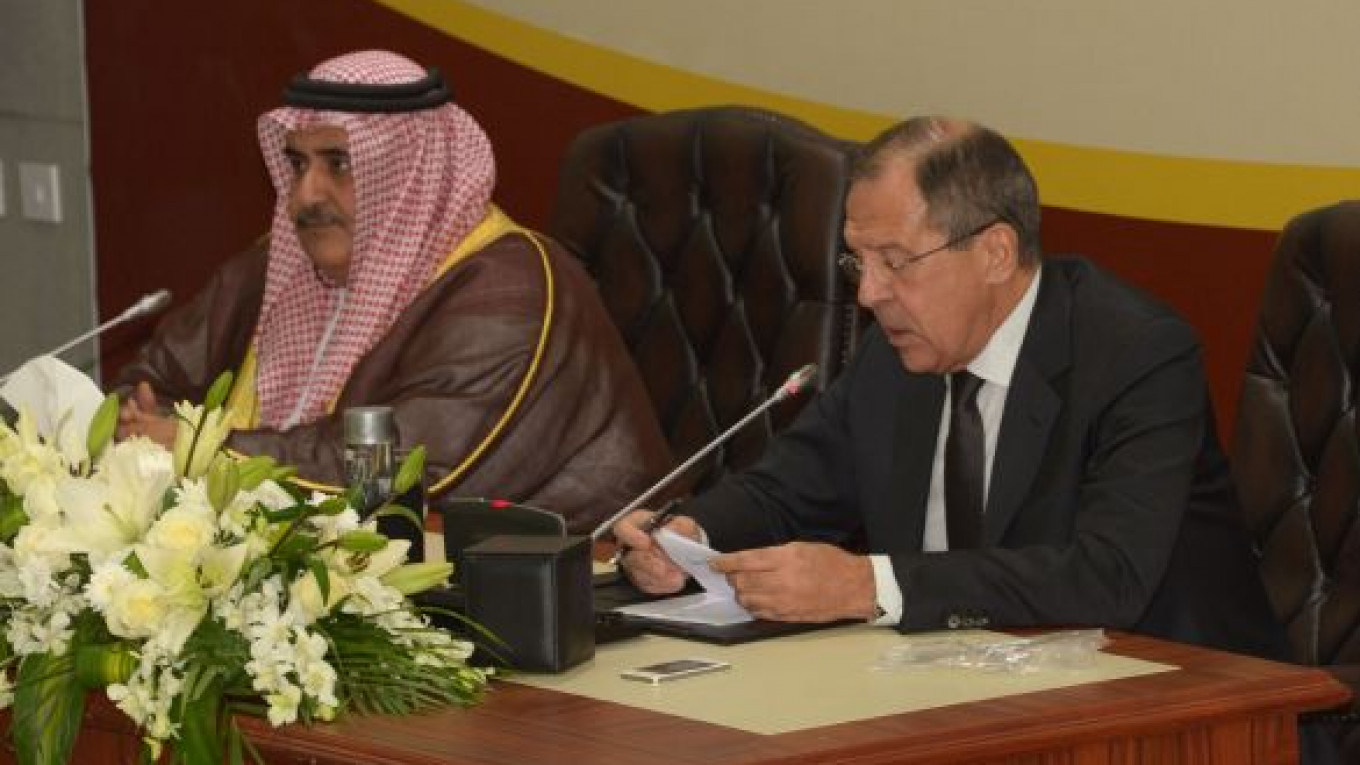RIYADH, Saudi Arabia — Foreign Minister Sergei Lavrov has condemned the bloodshed in Syria as "outrageous" and urged opponents of President Bashar Assad inside and outside the country to form a united front to end the crisis.
Lavrov met with foreign ministers of the six-member Gulf Cooperation Council for more than two hours in Riyadh but failed to reach common ground on how to end the bloodshed that has claimed more than 38,000 lives in Syria.
Lavrov was hoping to raise Moscow's profile in a region where its influence is at risk after blocking three United Nations resolutions meant to put pressure on Assad to end the bloodshed.
"We believe the bloodshed should be stopped," Lavrov told a joint news conference with the Bahraini foreign minister, Sheikh Khaled bin Ahmed al-Khalifa, after the talks on Wednesday in the Saudi capital.
"What is happening in Syria is outrageous," he added, speaking through an interpreter.
Sheikh Khaled said the two sides agreed to "keep working together to remove obstacles and points of disagreement" through further dialogue and meetings at various levels.
The 20-month-old Syrian uprising has further strained traditionally uneasy ties between Russia and Saudi Arabia, a key ally of the United States.
It was Lavrov's second Middle East visit in less than two weeks. Last week in Cairo he embraced an Egyptian-backed drive to bring together four regional powers to seek a solution to the Syrian crisis.
Saudi Arabia, which supports the rebels fighting to topple Assad, has skipped two ministerial meetings of the group, which includes Egypt and Turkey — also critics of Assad — and Iran, Syria's closest regional ally.
Qatari Foreign Minister Sheikh Hamad bin Jassim bin Jabr al-Thani said no breakthrough was made in the talks.
"We have spoken at length on the situation in Syria and how to find solutions," Sheikh Hamad told journalists after the talks. "We have a point of view, and our friends in Russia have a point of view, and they did not converge."
Lavrov had hoped to persuade Saudi Arabia to back the inclusion of Iran in peace efforts on Syria. Saudi Arabia sees Iran as part of the problem because of its support for Assad.
Diplomats have said it was hard to see Saudi Arabia agreeing to bring in Iran into any talks on Syria.
"There is no way in the world Saudi Arabia would sit down to talks with Iran — and even if it did, it would not be Russia convincing them to do that. So this trip really is just about Russia trying to be present in the Middle East," a diplomatic source said in Moscow.
Russia has insisted that any new UN resolution should be based on a June 30 agreement reached by international powers in Geneva that envisaged a transitional government in Syria.
The United States said the deal signaled to Assad that he must leave power, while Russia disagreed. Neither Iran nor Saudi Arabia were represented at the talks, with Washington, London and Paris accusing Tehran of helping Assad crush the uprising.
Back then, Russia was saying both should have been invited.
"The Russians would like to broker some sort of arrangement on Syria, a managed transition that will preserve their equities and those of their clients in Syria," said Nikolas Gvosdev, professor at the U.S. Naval War College.
Asked to comment about the new Syrian opposition coalition set up at a conference last week in Qatar, Lavrov said that the opposition remained incomplete without Assad's opponents inside the country.
"We urge the opposition groups to get united and form a negotiating team. Without attracting the internal opposition, it is hard to believe that this process is inclusive," he said.
Chilly ties between Moscow and Riyadh date to the Soviet war in Afghanistan in the 1980s, when Saudi Arabia backed anti-Russian militants. Russia has been concerned by the presence of Saudi and other Arab militants fighting in the post-Soviet wars in Chechnya and the Islamist insurgency they spawned.
A diplomatic source in Moscow said Lavrov's visit may be a "damage control" attempt after Riyadh condemned as hostile remarks by a Russian official who in July expressed "great concern" over human rights in Saudi Arabia.
Related articles:
A Message from The Moscow Times:
Dear readers,
We are facing unprecedented challenges. Russia's Prosecutor General's Office has designated The Moscow Times as an "undesirable" organization, criminalizing our work and putting our staff at risk of prosecution. This follows our earlier unjust labeling as a "foreign agent."
These actions are direct attempts to silence independent journalism in Russia. The authorities claim our work "discredits the decisions of the Russian leadership." We see things differently: we strive to provide accurate, unbiased reporting on Russia.
We, the journalists of The Moscow Times, refuse to be silenced. But to continue our work, we need your help.
Your support, no matter how small, makes a world of difference. If you can, please support us monthly starting from just $2. It's quick to set up, and every contribution makes a significant impact.
By supporting The Moscow Times, you're defending open, independent journalism in the face of repression. Thank you for standing with us.
Remind me later.


